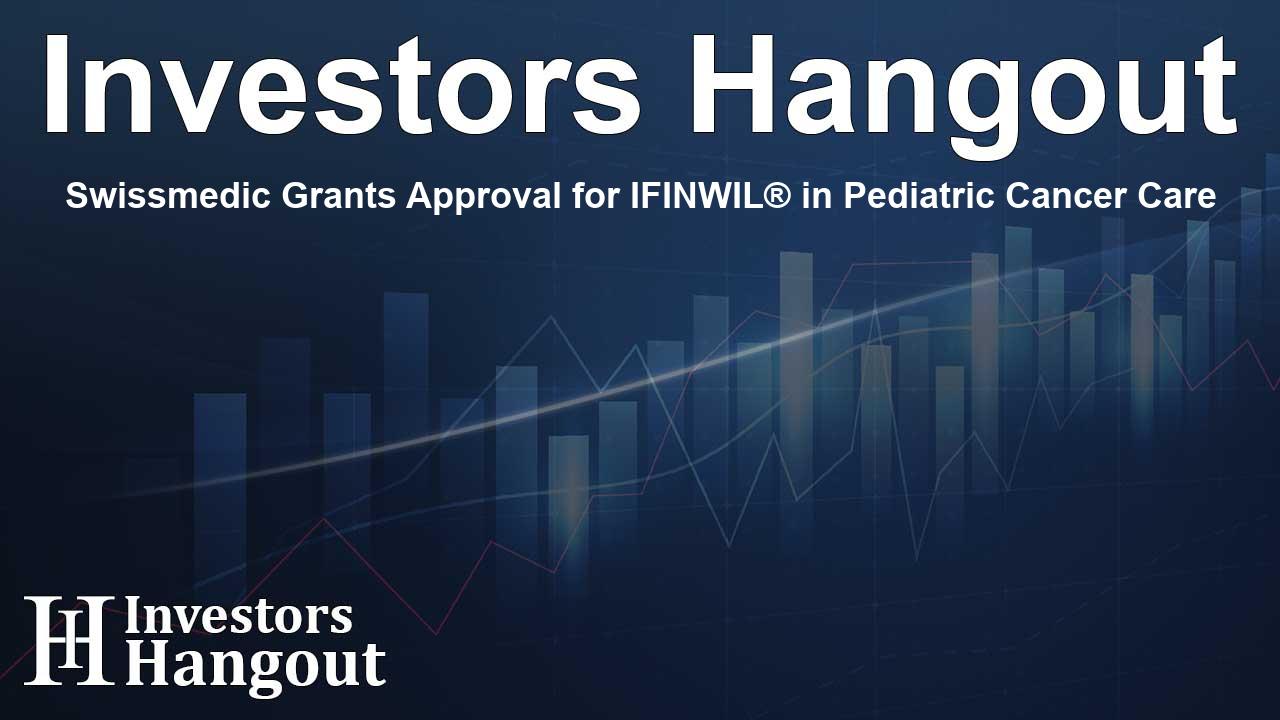Swissmedic Grants Approval for IFINWIL® in Pediatric Cancer Care

Swissmedic Approves IFINWIL® for High-Risk Neuroblastoma
Swissmedic has recently granted approval for IFINWIL® (eflornithine), marking a significant milestone in the treatment of high-risk neuroblastoma (HRNB) in pediatric patients. This approval makes IFINWIL® available as a monotherapy for children aged one and older, providing new hope for those affected by this aggressive form of cancer.
Understanding High-Risk Neuroblastoma
Neuroblastoma is recognized as the most common solid tumor outside of the brain in children, with a staggering 90% of cases occurring in children under the age of five. Unfortunately, the prognosis for those diagnosed with high-risk neuroblastoma is grim, with an average survival rate of only 50%. This highlights an urgent need for new treatment options that can improve outcomes for these young patients.
HRNB is particularly challenging, as it tends to be diagnosed after significant progression of the disease. By the time symptoms emerge, it can often be too late for existing treatments to be effective. The approval of IFINWIL® represents a crucial advancement, as it has been designed specifically for the post-maintenance treatment of patients who have successfully reached a stage of no active disease following initial aggressive therapies.
Significance of IFINWIL® in Cancer Treatment
IFINWIL® operates by inhibiting an enzyme known as ornithine decarboxylase (ODC), which plays a vital role in the synthesis of polyamines that facilitate tumor growth. This mechanism is critical, as neuroblastoma is known to thrive on these compounds. Its ability to block the pathways necessary for tumor sustenance underlines why IFINWIL® could significantly alter treatment paradigms.
Jörg Plessl, VP and Head of Global Regulatory Affairs at Norgine, emphasized how this latest approval illustrates the collaborative efforts between global regulatory bodies. Through initiatives like Project Orbis, partners across various jurisdictions work together to expedite the availability of innovative therapies in pediatric oncology, thereby ensuring timely access to life-saving treatments.
Collaborations and Future Directions
Dr. David Gillen, Chief Medical Officer at Norgine, added that the effort to broaden access to groundbreaking therapies is a central part of their mission. Collaboration with regulatory authorities allows for faster introduction of new medications that can fundamentally change patient lives. This is particularly pertinent in pediatric oncology, where children face unique challenges and often require swift, effective interventions.
Despite existing treatments, many children with HRNB experience relapse. Current statistics show that nearly 80% of those with high-risk neuroblastoma relapse within two years of diagnosis, and long-term survival remains troublingly low. As such, options like IFINWIL® are not just additional treatments; they represent a beacon of hope for countless families navigating the complexities of childhood cancer.
About Norgine and Their Commitment to Patient Care
Norgine has been at the forefront of delivering transformative medical solutions to patients for over a century. With a robust presence in various countries and a commitment to addressing complex disease areas, Norgine continues to innovate in the pharmaceutical landscape. The company is proud to state they have supported over 25 million patients worldwide in recent years.
With manufacturing sites in the UK and France, as well as a significant product development infrastructure, Norgine is uniquely positioned to bring forth specialized, innovative products that can make a real difference in the lives of those facing severe health challenges.
Frequently Asked Questions
What is IFINWIL®?
IFINWIL® is eflornithine, a medication approved for the treatment of high-risk neuroblastoma in pediatric patients, operating by inhibiting tumor growth enzymes.
Why is HRNB challenging to treat?
High-risk neuroblastoma is aggressive, often diagnosed late, and has a high rate of relapse, making successful treatment difficult and urgent.
What effect does IFINWIL® have on neuroblastoma?
IFINWIL® blocks the enzyme ornithine decarboxylase, which is crucial for the growth of neuroblastoma tumors, potentially improving patient outcomes.
Who regulates the approval of medications like IFINWIL®?
In various countries, regulatory bodies like Swissmedic, the US FDA, and other international authorities oversee the approval processes for new medications.
How does Project Orbis accelerate drug approval?
Project Orbis facilitates international collaboration among regulatory agencies, allowing concurrent reviews and faster access to innovative cancer therapies for patients.
About The Author
Contact Evelyn Baker privately here. Or send an email with ATTN: Evelyn Baker as the subject to contact@investorshangout.com.
About Investors Hangout
Investors Hangout is a leading online stock forum for financial discussion and learning, offering a wide range of free tools and resources. It draws in traders of all levels, who exchange market knowledge, investigate trading tactics, and keep an eye on industry developments in real time. Featuring financial articles, stock message boards, quotes, charts, company profiles, and live news updates. Through cooperative learning and a wealth of informational resources, it helps users from novices creating their first portfolios to experts honing their techniques. Join Investors Hangout today: https://investorshangout.com/
The content of this article is based on factual, publicly available information and does not represent legal, financial, or investment advice. Investors Hangout does not offer financial advice, and the author is not a licensed financial advisor. Consult a qualified advisor before making any financial or investment decisions based on this article. This article should not be considered advice to purchase, sell, or hold any securities or other investments. If any of the material provided here is inaccurate, please contact us for corrections.
